March, April and May is indisputably the most exciting quarter in my annual schedule. The sun is trying its best, the air is sweet with freshly cut grass and there’s an intoxicating whiff of expectation in the air. More than any other season in the year, spring gets me all charged up with excitement. And there’s a very good reason for that. Spring means the Eurovision Song Contest.
Aside from the obvious components of the Song Contest – that which we all get excited by, our common bond if you like – the Contest offers me something a whole lot more seductive. Every spring there’s an opportunity for the ultimate kind of project work: planning, writing, reviewing and publishing; self-imposed project work which must be completed before the main event.
The Grown-Up Responsibility Of Getting Ready For Eurovision
I don’t expect to just sit down and watch the Grand Final without having done all the necessary work beforehand. As a kid that meant drawing up a voting table, looking back over the songs the BBC broadcast in its Sunday afternoon preview shows, and making sure my audio cassettes were lined-up and labelled for the big ‘record the show off Radio 2’.
Those early-day fanboy preparations have expanded considerably in the intervening years. Nowadays, all sorts of preparations need to be put in place before that moment can arrive. Eurovision provides me with – and I’m sure quite a lot of others like me – the ultimate, most glorious, kind of after-school club.
Until this year, I’d thought this was an unusual thing, that I was somehow odd in my Eurovision ritual, and that if I was too open with my colleagues, say, I’d damage relationships and make meetings a little bit more thorny.
It Helps That My Line Manager Loves Eurovision
But I’ve noticed a change this year. My planning started earlier for a start (January) with travel and accommodation booked by February. These seemingly banal changes in my annual ritual were stimulated by my line manager who is equally enthusiastic about Eurovision as of live events in general.
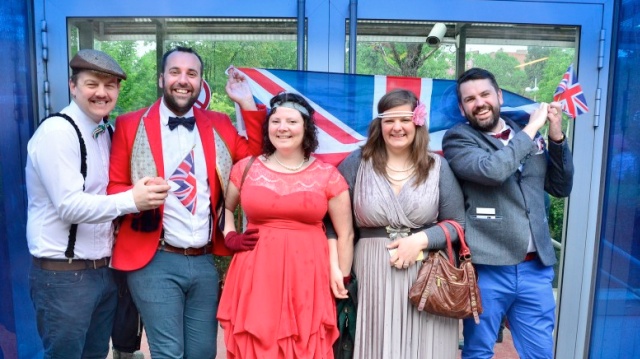
One of these people, pictured here before one the second semi-final in Austria last year, is my line manager. To preserve that person’s anonymity (and my own career), I’m not going to tell you which one. (Photo credit: Jon Jacob)
My boss was uncontrollably excited during the London 2012 Olympics and finds it difficult to climb down after the Six Nations. That kind of unbridled enthusiasm is unusual in the workplace. It also makes booking extended annual leave in order to attend The Contest a relatively straightforward process. That enthusiasm is also infectious, drawing a great many hitherto circumspect workplace Eurovision fans from obscurity to mainstream respectability.
Any Trip To Eurovision Needs To Be Legitimised
That change in status and respectability has been dramatic when I think back to the time when I first went to Eurovision. In 2003, there was a sense a sense of guilt (perhaps embarrassment) associated with admitting to watching the programme, let alone wanting to attend it.
But, Eurovision is seductive; the experience of attending it is addictive. Like a great many other people, I can’t really say I have a contractual need to be at the Song Contest, yet the Contest still draws me. To not feel a part of it in some way would be like ignoring a partner at a family wedding.
So legitimising any trip is vital (to justify the enormous amounts of money spent to go there). And one way to do that has always been creating content about or contributing to it in some way. No surprise then that for the past twelve years – more or less – I’ve rubbed my hands together with glee whenever the Contest approaches.
Eurovision’s Digital Empowerment Of A Generation Of Writers And Commentators
The digital space has provided me with an outlet for my Eurovision-inspired utterances in a way that television and radio hasn’t and never will.
Digital empowers the self-publishers, fuels professional self-development, powers experimentation online and, now with the advent of social media, has a built-in and cost-effective distribution network. Throw in a cult TV programme built upon subjective opinions, supported by passionate and vocal individuals and you’ll find the digital publishing sweet spot.
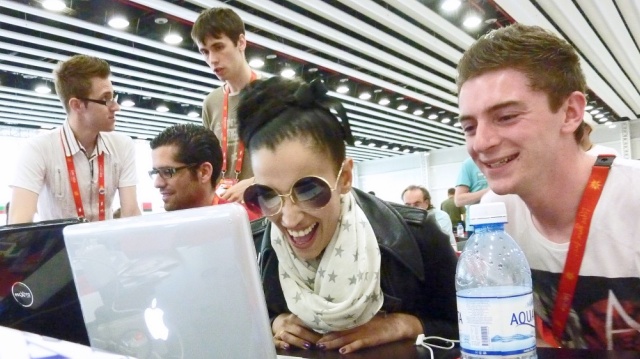
Broadcasting live to the world
That’s been my experience of Eurovision over the past 12 years. Whether it be reading, participating in forums, or writing for my blog, Eurovision provides me with a creative outlet. From early on (by which I mean 2001 when I started designing and building websites) the Contest offered a framework for website production – content that would take my theoretical understanding of what a website could be and turned it into something real.
Eurovision gave me something to write about at a time when I was unexpectedly reunited with a childhood love of writing. First song reviews, later, blogging. Regardless of the outcome of the actual contest, here was an annual event which promised a variety of different things which could provoke a reaction and therefore an opinion. I could run a website without the added pressure of it actually being contractually required.
In the process of creating that content about the Contest I loved, I was developing my skills, skills which would be vital in helping change my career direction. In that respect, I owe Eurovision a lot (well, kind of, if one can actually owe a unwieldly TV production anything). And I don’t believe I’m the only one either
Many others embraced the opportunites early on, combining the simplicity of HTML ‘coding’ and the emergence of self-publishing (and later the rampant rise of social media). That combined with what now seems like a progressive attitude on the part of the European Broadcasting Union in the early 2000s to welcome more fans behind the scenes created a sweet spot for obsessives like me, something dangerously sticky too.
The Breathtaking Experience Of The Online Community
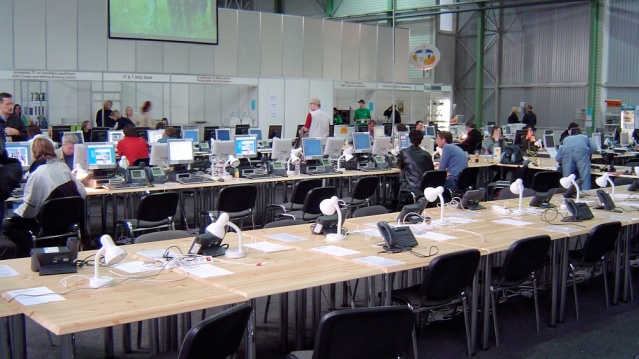
The press centre in Riga 2003. I remember this being a huge place teaming with journalists and fans. It looks so small thirteen years later. (Photo credit: Jon Jacob)
I saw it all around me when I went to Riga in 2003. Websites, fansites and blogs had already sprung up in the early 2000s, led in part by Sietse Bakker’s ESC Today. It was breathtaking to see: like the first introductions at a massive party you’d had no idea had been going on for so long. These platforms empowered fans, providing an outlet for would-be commentators and part-time journalists. The myriad of websites reflected the early perceived democratisation of the web, feeding a widespread closeted appetite for behind-the-scenes insights, considered opinions and bitchy put-downs of the kind many wished they could get the chance to say on-air.
And that has grown and grown. Eurovision has given a voice to more and more writers, journalists and fans, some tapping into their already considerable networks of friends and contacts to amplify their message, and in some cases schtick, establish reputations, secure airtime and sell books. At the same time Eurovision has given them a platform for the ongoing –development digital skills. Social media has widened that platform – meaning everyone has a platform to share their views in whatever creative method they want.
Eurovision’s Dominance In Digital Has Its Roots In The Contest
And the secret to that is rooted in the format itself. The Eurovision Song Contest is a family entertainment show. Producers know that everyone who watches it will have a differing opinion about what’s good, bad or downright unfathomable. The Song Contest depends on it. And social media – blogging, Twitter, Facebook and messageboards – depends on personal opinions to keep it buoyant too. Eurovision and social media are co-dependents. Little wonder its difficult to keep away.
It’s taken a long time for industry to take the bait. In most other areas of my professional life, for example, I see a distinct delineation between audience member and journalist and output. One might even describe them as distinct battlegrounds. But in Eurovision those boundaries have for at least fifteen years possibly longer, been blurred. That blurring has caused headaches for record company and broadcaster publicity machines who, early on, overlooked the rich opportunities to be exploited the fan-fuelled digital ecosystem which has emerged over the years.
The Value Of The Eurovision Community
But in recent years I’ve seen a real shift. Where Eurovision empowered would-be digital content producers obsessed by their most favourite of television programmes, so their continued involvement, and in some cases growing dominance, has transformed that ecosystem. PRs and publicists now increasingly turning to ‘third-party’ websites run by fans in order to distribute their messages and announcements. Fans previously dismissed by PRs as nerdy anorak types to be avoided, are now vital in raising awareness, increasing popularity and securing votes. Where mainstream press publications were the real estate to seduce, now fan-run community sites, blogs and Twitter accounts offer the valuable cut-through. The fans and their platforms have more power than they ever did before.
That transformation, although slow, is distinct. And although it will be a long time before any of the big websites willingly make their website traffic available to the public (basically never), there is another way of illustrating that change in fortune.
More Sites Means Less Traffic

Standing room only in Vienna 2015. (Photo credit: Jon Jacob)
I’m happy to admit, for example, that traffic to my personal blog has dropped significantly since 2011. The trend remains generally the same: a steady rise in page views during April with a significant spike in the fortnight running up to Eurovision, and a general drop off come June. But, where the figures were in the ten of thousands in April growing to hundreds of thousands in the days before the Contest back in 2008 (traffic which I normally regarded with a mixture of excitement, bewilderment and, in some cases, horror), last year’s traffic for May topped a measly eighteen thousand.
There are a number of things which help explain that drop in traffic. At the risk of being a little nerdy, WordPress – a popular blogging system – offers two ways of running a blog: either part of their already established network, or on your own domain. The former offers a more integrated method of reaching a networked audience; the latter makes more demand on me as a blogger to establish that network. The difference between the two setups is the equivalent of moving from the middle of the metropolis to a more serene rural setting and hoping that people will come with you. When they don’t your traffic will drop.
If you change the layout of your content, for example, or changing the kind of content you’re offering or worse, as I did one year, just thinking “Sod it, I’m giving myself a year off from all of this,” will have a significant impact on audience expectations.
But I’m at pains to point out that this is not me saying “I used attract quite a lot of readers and now I don’t and I’m a bit sore about that.” Instead, I’m highlighting how I’ve seen the growing popularity of Eurovision change audience reach, share and expectations in the digital space. After fifteen years that digital landscape has changed significantly: there are widely recognised online destinations providing distinct content for a wide range of audience needs, some sites have even created an audience appetite for a new generation of Eurovision fans. As a digital content producer in my professional life I’m only too aware of the impact of large-scale sites can have on cut-through and the demands placed on members of the audience. Put simply: more doesn’t necessarily mean better; there are so many hours available to read this stuff.
So, start your Eurovision blog now with high expectations that your audience will break your server and you’re going to be disappointed. You’re going to need to do or say something that no-one’s done before. You’re going to have to see a different angle on the Contest that hasn’t been seen before, and one which taps into an audience need everyone else has overlooked. That’s not to say its impossible, just that the challenge is overwhelming.
The Early Bloggers And Community Sites Are The New Mainstream
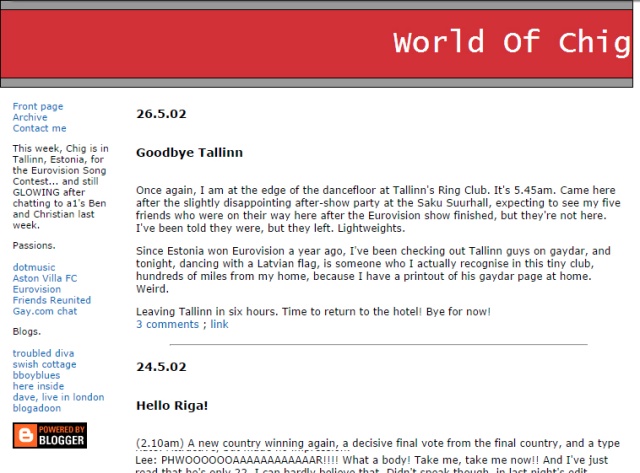
Chris Higgin’s blog ‘World of Chig’ was one of a handful of blogs I read back in 2002.
Back then I was an avid reader Chris Higgins’ blog, looked on in awe at the online voting functionality on Graham Soult’s website, enjoyed Eurovisionary, and thought I’d died and gone to heaven when I discovered ESC Today. Now I turn to the likes of ESC Insight and those long-standing sites that remain as the stalwarts of the news and opinion service – miracles of knowledge and passion that are freely available and whose funding model is seemingly impossible to fathom out.
These are no longer the gritty, cheek-by-jowl online destinations some of them seemed when I first discovered, now they’re part of the Eurovision establishment. And they’re joined by a growing number of people who recognise the appetite of data-driven information about the Eurovision. Pre-contest polls like those from ESCGo, Wiwi Bloggs, Eurovision Ireland, and ESC Nation illustrate the passion of the site’s producers and the skills they’re developing producing the functionality.
Eurovision audiences are well-served in the digital space. In fact, there may well be too much choice. Don’t let anyone think I’m complaining about this state of affairs. Compared to where we were in 2002, there has been a dramatic change in the quality and frequency of this kind of ‘programme support’ output. And that has helped demonstrate to the EBU just how popular their Song Contest is, helping keep TV people on their toes. And that in turn has helped enhance Eurovision’s considerable inter-continental reach.
The Next-Generation Of Eurovision Performers
In recent years I’ve seen more younger people embracing Eurovision, self-publishing and social channels to articulate their love of the Contest. That’s surprised me. I assumed that love of the Contest would skip a generation or, worse, eventually fizzle out. Not so, YouTube is awash with personal predictions, rankings, reviews, not to mention ripped performances. (No surprise then that Eurovision makes its official content more prominent in search with an ‘Official Video’ or ‘National Final Performance’ banners overlaid on its videos.)
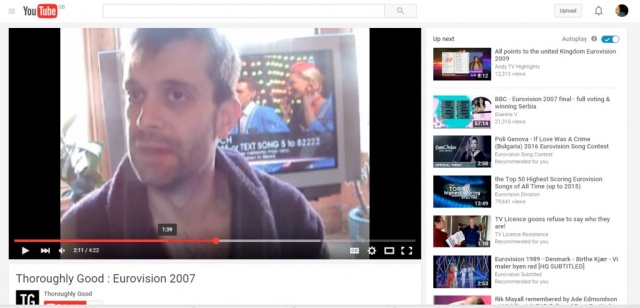
I used to rant in videos once. The people who do it now are much much better.
It’s taken me a long time to realise that it is the next generation of Eurovision fans – the teenagers and the twenty-somethings for whom video is as natural medium to articulate views as text was to early bloggers. It seems incredible just how far Eurovision’s reputation has come: there was a time when most Eurovision fans were regarded as slightly odd for their cult interest in the Contest, now its as normal a TV show to get excited about as … well, anything. And that change in fortune is down to early bloggers (and the show’s content too, obviously).
A New Personal Narrative
I know I’ve felt disheartened by the dwindling reach and even less impact my Eurovision blogging has resulted in. The action I took was a little childish, I suspect. On some level I was discouraged by what appeared to be a new narrative about Eurovision – less about songs and TV production, more about celebrity and costumes, a desperate competition for who could be the bitchiest, all of it underpinned by an alienating tone of voice.
Was I getting too old for this? What was the point in competing with the new kids on the block? The message I was giving myself seemed to be: if you want to be part of this, you need to ‘serve’ a new audience in a different way. But, I’m already paid to think like that at work, why would I want to do it in my free unpaid time about something I love?
Returning To A Favourite Holiday Destination
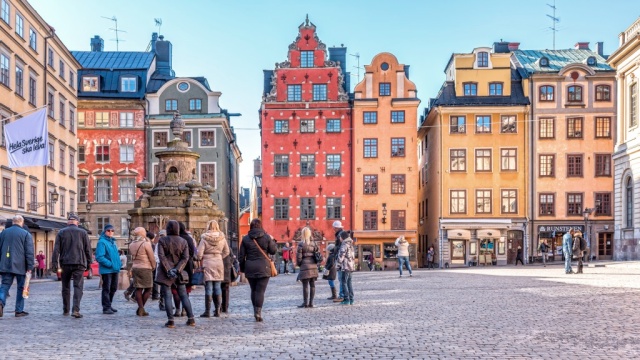
Gamla Stan, Stockholm. I’ve been twice before. I cannot wait to return.
Something has changed this year for me.
This year, spurred on by my colleagues who are themselves making everyday conversation about ‘Eurovizsh’ (Okay, you can say that just this once – Ewan) I’ve reconnected with my Eurovision content production roots. It as though I’ve had the chance to take stock, recognise what a remarkable environment it has been for me and others like me. Once I did that the prospect of returning to what I used to do and enjoy doing it was the equivalent of returning to a favourite holiday destination. That too has encouraged me to make plans early, for what will be the most special trip ever: the first time my partner Simon has ever attended Eurovision.
And that too has helped remind me of one of the magical reasons some of us were attracted to blogging in the first place. Blogging isn’t done for traffic – that isn’t or shouldn’t be the primary motivation for writing about the thing you love. The most important member of the audience you’re writing for when you’re blogging is yourself. Anyone else who reads what you write and enjoys it is a new friend. And if you want to feel as though you are a part of thing you’ve loved for years, the best way to do that is to make stuff about it.
This year’s blogging returns to what I did as a kid, what I imagine everyone did as a kid: reviewing songs one by one; letting the naff and the pointless and the weird and the unfathomable get under my skin; playing a game with myself to work out what might win and what might not. Eurovision is an after-school club for the Spring Term and one, this year, I’m loving participating in.










Superb article – I could relate to a lot of that with my own blogging background (I have a long way to go to match Jon though, only almost 3 years here!). His line about blogging because you enjoy it is spot on – I’m not a news guy, I love to review and occasionally put my two-penneth in, and as much as I love the number of views I get (only a third of Jon’s ‘measly’ 18000 a month at the moment!), it’s more about recording my thoughts and putting them out there for others to read.
Hopefully I’ll still be going and enjoying writing for many more years to come – articles like this help you think about how to ‘take it onto the next level’.
There is that marvellous moment when you discover there’s a world of fellow Eurovision obsessives. Yay! Hurrah! Love! Hugs! Then you get flamed and what is really a light singe feels like immolation. Then you realise there are affiliations and groups of mean girls and some people think you’re a mean girl and…and…and….
And then you remember you’re an adult and so you take a deep breath and just enjoy it for what it is. Even when you know those other people are totally wrong and can’t wait for when _______ wins in May.
No, none of your article resonates, not a bit. 😉